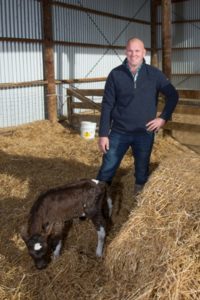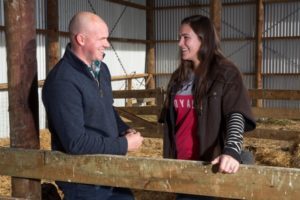Aaron and Holly Jackson didn’t stint on the diligence when looking at their next step in the dairy industry, they told Anne Lee how they used friends, experts, checklists and historic facts to make a considered decision.
Aaron and Holly Jackson talked to respected peers, sought independent advice and had to weigh up a lot of pros and cons when they were assessing next step opportunities in their dairying career, particularly when it came to looking at contract milking jobs.
In the end the Culverden-based couple took up a job that ticked all the boxes for them, going 50-50 sharemilking on a 360-420 cow job.
“The sharemilking opportunity came up literally right at the last minute and it was perfect for us but we’d looked at contract milking and other sharemilking jobs before then.
“Each one was different and we had to look really carefully at them but we set some criteria – things that were important to us about a job,” Holly says.
It hasn’t been a direct progression path for the couple with Aaron doing three years dairying straight out of high school in Christchurch before shepherding for eight years and taking on an engineering job with Akaroa Salmon.
During that time, he met Holly who completed a post-graduate teaching diploma and then secured a secondary school teaching position in Hawke’s Bay.
Aaron found work as a machinery manager on a 2500-cow operation in the region and while he was working there the pair decided they were keen to get involved and start climbing the progression ladder in the dairy industry.
Aaron worked as 2IC on a 1600-cow, split-calving farm but six months in stepped up to manager when the manager left.
They saw the season out in Hawke’s Bay and then returned to their home province of Canterbury taking on a manager’s role for Holly’s uncle Stuart Neil at Culverden.
Holly was able to teach at the local area school just a couple of minutes’ drive from the farm and Aaron says working for Stuart was a great way to learn and gain valuable experience.
During the four years on the 660-cow farm they were able to lease cows into the herd and could rear both their owner’s calves and calves from the cows leased to him.
They were then able to take a cut from the replacement calves as the lease payment.
Aaron says they also bought animals when they could, always purchasing higher breeding worth (BW) and production worth (PW) stock.
‘You really need to look at any contract very closely to work out what you’re really going to end up with in the hand at the end of the year.’
When payout was low they sold selected older animals and replaced them with higher-quality heifers for a similar price.
“And with the way we were leasing them it worked out quite well,” Holly says.
At one stage there had been talk about setting up a sharemilking partnership with their farm owner and while it didn’t eventuate the couple say it gave them confidence to take a look at the next step in terms of progression.

They’d also surrounded themselves with top performers in the industry and count New Zealand sharemilkers of the year Justin and Melissa Slattery among their best friends.
They sharemilked nearby until they ventured back to the North Island this season having realised their dream of buying their own dairy farm.
“If you surround yourself with positive people it’s like a wave – you get pulled along. It’s no different to what we tell kids at school – have good friends – your peer group is important,” Holly says.
“They were really important to us as sounding boards and Mel went through the numbers with us.”
James and Ceri Bourke are also mentors, friends and sounding boards for the couple.
They were runner-up in the Canterbury sharemilker/equity manager of the year award in 2014 and farm nearby, also in the Amuri basin.
Holly says they discussed their job options and budgets with James.
“He’s helped us a lot and has so much knowledge about dairying. He gave us a really good broad holistic view of the next step,” she says.
During their time at the Neils, Aaron and Holly had two children – Tom now 3, and one-year-old George – so it was important that any next step in their farming career meant they were within easy commuting distance to a high school so Holly could carry on teaching.
It just makes the whole thing more sustainable, Aaron says.
“We looked at a few jobs and there were pluses and minuses for all of them – you really have to work out what your criteria are and what’s important, what your bottom lines are before you can really weigh them up,” Holly says.
Initially they thought any contract milking job they looked at needed to have large scale to make it worth their while but they found there were other factors that could be more important in making the job a success.
One job they seriously considered was to contract-milk 850 cows for a large-scale sharemilker with 2000 cows.
It was a bit of stretch in terms of commute time for Holly but an even greater negative was the standard of housing, particularly for the staff.
“It would have made recruiting staff quite difficult I think,” Aaron says.
On the positive side were gains that could be made with stock.
“That was one of our criteria – to have some kind of stock gains in the job.
“We had cows we wanted to bring to the job and we really didn’t want to have to sell them when cow prices were low.
“For this particular one we were able to take our own cows and lease them into the herd which is really positive for us but we could also mate his heifers – we’d pay for them to be AI’d and we’d keep the replacements.
“He’d said that if it worked out well on that farm we could do it across all his heifers,” Aaron says.
“The fact he had 2000 cows was quite appealing because he understood where we could make extra money and was open to opportunities for us,” Holly says.
The contract rate was a straight cents per kilogram of milksolids (MS) rate.
On the budgets they looked at, Aaron and Holly say they wouldn’t have taken any jobs at less than $1/kg MS.
“There was another job that was offering under a $1/kg MS but it included a percentage of the milk cheque – 4%. We’d also be up for 11-14% of the costs and we would have had to provide a lot of gear – similar to what you’d take as a sharemilkers,” Aaron says.
There was no option for stock gains but the accommodation was good, it was a great shed and the cows were good,” Holly says.
“But when we looked through the numbers with Melissa, it actually came out quite low – there wasn’t much falling out the bottom. You really need to look at any contract very closely to work out what you’re really going to end up with in the hand at the end of the year,” Holly says.
They saw that if there were too many quirks and variations away from the Federated Farmers contract as a bit of a warning sign.
“We saw one that was a Word document wholly put together by a farm adviser and there are just too many places things can go wrong.
“The Federated Farmers contract has everything covered and if you want to put in your own add-ins well that’s okay if you all agree to them and you check them out properly but if you don’t have that scaffolding of the Federated Farmers contract you’re taking a big risk,” Holly says.
The pair say they looked at contract milking as the next step from managing because it didn’t require a whole lot of capital to get in.
There also weren’t a lot of smaller sharemilking jobs around.
“If we could take our cows and lease them into the herd and do something like mating the heifers to build up numbers we thought contract milking could be a way to grow our equity and skip the smaller sharemilking job.
“We thought it could give us a way to leap frog over that smaller job – the jobs that seem to have disappeared,” Aaron says.
“With contract milking you don’t have the risk of trying to find the next job – somewhere you can take your cows.
“If the payout is low when your sharemilking contract ends you have the risk you might have to sell your cows when prices are low and that’s a big risk to your equity,” Holly says.
In the end though the couple were offered a 50-50 sharemilking job for Ken Riddington at Culverden – just a short distance for Holly to go to work.
It was a fantastic opportunity and ticked every box for the young couple.
This season the farm is in the direct path of work to put pipe in the open races of the Amuri Irrigation Scheme so, with some paddocks out, cow numbers were set at 360.
Aaron says they should rise to 420 once the paddocks are back in again for full season and border dyke irrigation is converted to spray.
Aaron and Holly had 300 cows of their own – 94 of them heifers and 100 of them three year olds.
Ken put 100 of his own cows in.
“He wanted the sharemilking contract to be a straight percentage rather than 50-50 for 300 and a management fee for the rest so we lower order sharemilk Ken’s 100 cows and 50-50 ours so that the overall average is a 44-56% split – we get 44% of the milk price and pay 44% of the costs including the cost of supplement and nitrogen with Ken still helping to pay young stock grazing.
“It was a great opportunity for us and when we compared it with the 850-cow contract milking job we could see that on one hand we could make say $100,000 in cash including our stock gains there but on the other hand with this sharemilking job we could see our equity growth with stock and our chance to grow our business faster,” Aaron says.
Ken’s great reputation in the community and with previous sharemilkers was also a factor and the couple are thrilled they’re on the next rung of their progression ladder.
Anne Lee
anne.lee@nzfarmlife.co.nz
@Cantabannelee
For more advice from John Donkers, Due diligence directly diverts disasters, see Young Country section p84

Aaron and Holly’s decision-making hacks
- Make a list of what’s important to you.
- Are there stock gains?
- Have the budget emailed to you ahead of any interview so you can double check it and have your questions ready.
- Make sure all costs are included.
- Check the accommodation.
- Make sure production is realistic and find out what feed has gone in previously to get historic production.
- What feed is budgeted for the production target?
- What’s the policy on supplement – when is it fed, what’s fed and what situations won’t it be fed in?
- What’s the supplement policy with drought, irrigation failure or a sudden big payout drop?
- What’s the policy with calf milk?
- Do you think you can get on easily together?
- Talk to previous contract milkers or managers?
- Talk about everything up front – don’t assume anything.





